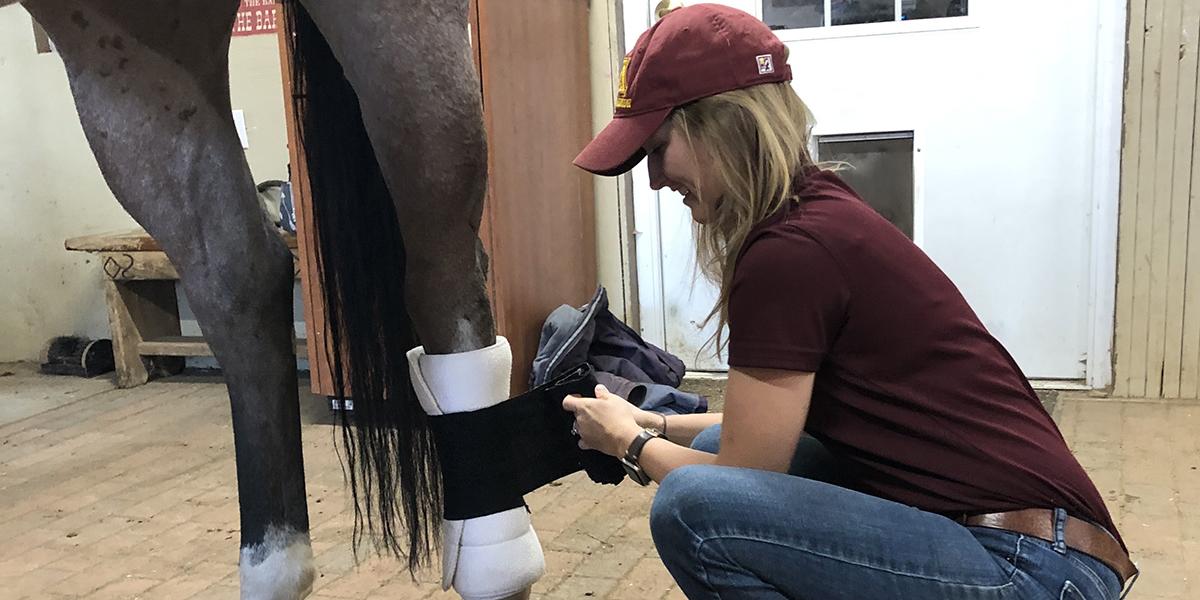Preserving opportunity
Externships provide invaluable student training, even during a global pandemic.

Externships provide invaluable student training, even during a global pandemic.
Repetition builds confidence and competence in veterinary students like Annie Roach.
In the early days of the COVID-19 pandemic, as panic swept across the world, externships were early casualties at many North American veterinary schools. The swift loss of these vital training opportunities was keenly felt by soon-to-graduate students.
Fortunately, faculty and staff at the University of Minnesota College of Veterinary Medicine rolled up their sleeves to save the externship program.
With the support of the University’s medical authorities, exceptions were granted to veterinary students wanting to complete an externship amidst the pandemic. Students applied for externships by describing where they wanted to go, how they would travel, where they would stay, and the working conditions. How they would be protected from the SARS-2 virus at each step was the primary concern.
Their responsibilities continued. “They are to stay in touch with the site and to let me know if anything changes and they can’t go to that site,” says Peggy Root Kustritz, DVM, PhD, DACT, MMedEd, associate dean of education at the College. “Some locations have been too busy with caseload to provide an externship. Some students decided the conditions were too risky. And some externships were canceled due to wildfires.”
2020 has been that kind of year—the unexpected has happened. But encouraging students to protect their health is not new for Minnesota.
“If adequate biosecurity protocols are not being followed,” Root says, “students are encouraged to talk to their site manager—with communications advice from us if needed—or to leave the site and come back home.”
Externships are a vital ingredient in a veterinary education. Today, the typical veterinary student at Minnesota completes four or more externships. They choose from a network of over 2,800 providers across North America. Gaining a diversity of experiences is the goal.
“Seeing a variety of first opinion cases and managing them through client needs including financial constraints,” Root says, “requires students to think through how to prioritize diagnostic and treatment options.”
The College’s presence in a major metro area automatically gives students more externship options that are close to where they’re living. Root says the College is always looking for more providers. “Externships can be practices of any kind, research laboratories, industry, you name it—anything a person may do with their veterinary training is fair game for what our students may wish to experience as part of their training.”
Emma Bak’s list of veterinary experiences is long and growing: lameness exams, routine dentals, ocular exams, and hands-on clinical skills such as blood draws, vaccinations, floating teeth, staining eyes, and nerve blocks.
Those are a few of the things she practiced during an externship with Sunrise Veterinary Equine Services, a three-DVM equine-only practice in North Branch, Minn. Add in her proficiency with spays, neuters, and intubations and confidence in making diagnostic and treatment plans from externships with small animal practices, and you have a well-rounded future DVM. Which is precisely what Bak wants. The Class of 2021 student from Columbia Heights, Minn., is tracking mixed animal medicine.
Externships have shown me my strengths, the areas where my more recent knowledge from the classroom setting can be of value to a clinic.
Emma Bak
Externships have shown me my strengths,” Bak says, “the areas where my more recent knowledge from the classroom setting can be of value to a clinic.”
Perhaps more important than racking up experiences is the chance to learn the best way to handle a situation. Bak described her experience observing an exam on a very nervous horse.
“She didn’t rush the horse, but instead—using repetition, positive reinforcement, and patience—waited until the horse was comfortable with her before she proceeded with the exam. Getting to watch this vet and practice handling horses after her really helped me feel more comfortable and prepared to handle all kinds of horses.”
Sometimes a student wants to focus—learn from experienced veterinarians who share their passion for a particular species. The Minnesota program has that covered, too.
Annie Roach has been working toward a career in equine medicine since high school. Growing up in Reno, Nev., she rode horses competitively, which led her to complete a Master’s in Assisted Reproductive Technologies prior to applying to veterinary school.
She counts her externship with Stillwater Equine Veterinary Services in nearby Stillwater, Minn., as a highlight of her education. Roach credits alumnus Brian Dahms, ’01 DVM, with showing
her the importance of effectively communicating with all parties so that everyone is doing what’s best for the patient while solidifying a long lasting client relationship.
“Seeing Dr. Dahm’s passion for his patients and the friendships he has built during his career has reaffirmed my excitement for a career in equine medicine,” Roach says. “If the client trusts and respects you, everyone will benefit, especially your patients.”
College faculty teach students about diseases and conditions and share their experience as practitioners during clinical rotations. Roach says the value of her externships was to bring the pieces together and apply them to a case.
“There are a variety of ways to do any one thing such as sedation or diagnostics and you have to find out what is the method that works best for you,” Roach says. “Externships give you the opportunity to observe and even practice these methods in a real-life scenario so that you can start building your own opinions and practices.”
I loved the situations when the veterinarian took the time to talk with me and explain their thought process when working through a case, and was happy to answer my unrelenting questions.
Annie Roach
Finally, the opportunity to do hands-on work during an externship is important, but Roach says there are other valuable experiences.
“I loved the situations when the veterinarian took the time to talk with me and explain their thought process when working through a case, and was happy to answer my unrelenting questions.”